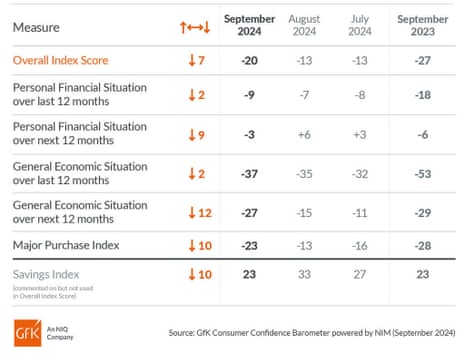Introduction: UK consumer confidence falls ahead of ‘painful’ Budget
Good morning, and welcome to our rolling coverage of business, the financial markets and the world economy.
Fears of a ‘painful budget’ next month have knocked morale among UK consumers – a bad sign for the economy.
The latest poll of UK consumer confidence has fallen sharply this month, with optimism over people’s personal finances, their purchase intentions, and the state of the economy all sharply lower than in August.
The index, published by data provider GfK, has dropped to -20 this month, down from -13 in August.
That is the lowest reading since March, when the index was -21,
Consumer confidence had been improving as the economy grew robustly in the first half of this year and inflation dropped.
But September’s large drop has almost wiped out the recovery in confidence seen since this spring.

The drop follows repeated warnings that next month’s budget will include tax rises to fix the public finances, following the unpopular decision to means-test the winter fuel payments for pensioners.
Neil Bellamy, consumer insights director at GfK, says the forward-looking indicators which feed into the index have dropped notably:
Bellamy explains:
All five measures are down but there are major corrections in the outlook for our personal financial situation for the next 12 months (down nine points), our views on the general economy for the coming year (down 12 points), and the major purchase index (down ten points).
These three measures are key forward-looking indicators so, despite stable inflation and the prospect of further cuts in the base interest rate, this is not encouraging news for the UK’s new government.
Strong consumer confidence matters because it underpins economic growth and is a significant driver of shoppers’ willingness to spend, Bellamy adds.
Earlier this week, DIY company Kingfisher reported weak demand for kitchens and bathrooms, as people resisted buying ‘big ticket’ items.
Bellamy adds that consumers are “nervously” awaiting Rachel Reeves’s budget statement on 30 October, saying:
Following the withdrawal of the winter fuel payments, and clear warnings of further difficult decisions to come on tax, spending and welfare, consumers are nervously awaiting the Budget decisions on 30th October.”
GfK polled just over 2,000 people, between 30 August and 13 September.
A few days before the survey began, Keir Starmer warned in a setpiece speech that the budget is “going to be painful”, and that “things are worse than we ever imagined”, after the government discovered what it calls a £22bn “black hole” in the public finances.
On the final day of its survey, Starmer hammered the point home, warned that painful decisions such as cutting winter fuel payment were necessary to fix the UK.
That message appears to have got through to consumers, even though Labour have also pledged not to raise the taxes on working people.

The agenda
-
7am BST: UK retail sales for August
-
7am BST: UK public finances for August
-
9am BST: Bank of England policymaker Catherine Mann speaks about the issue of macroeconomic adjustments after large global shocks
-
3.50pm BST: European Central Bank chief Christine Lagarde to deliver 2024 Michel Camdessus Annual Central Banking Lecture
Key events
A painful budget next month could be a blow to Christmas spending plans, fears Moody’s Analytics.
Following the surprisingly strong 1% jump in retail spending in August (see earlier post), Moody’s Analytics’ economist Barbara Teixeira Araujo says warm wather boosted the clothing sector last month.
But, she adds, consumers could cut back if tax rises are announced in October’s budget, further denting already-weak consumer confidence:
August’s results chime in with our forecast that retail activity will see solid growth in the third quarter following a weak second quarter, in line with the continued rebound in real wages.
But with the boost to real household incomes from the earlier sharp fall in inflation now fading, the pace of growth in retail spending may soon level off. To that we add the high likelihood of further tax rises being announced in October’s budget, which could further dent retailers’ prospects.
Already, separate data from GfK today showed that U.K. consumer confidence has tumbled to its lowest level since March in September. If this trend gathers momentum, retailers could be looking into a chillier-than-expected end to the year.”
Back in Germany’s car indusry, German economy minister Robert Habeck has said he wants to help Volkswagen get through a period of cost-cutting without having to resort to site closures.
But despite Berline’s concerns about the country’s biggest carmaker, Habeck indicated that VW would have to tackle most of its problems itself.
During a visit to the Volkswagen’s factory in Emden, Germany, the minister said he also wants to ensure that personnel policy measures remain within the normal collective bargaining framework.
Habeck’s comments come as Volkswagen’s management is set to enter heated talks with powerful unions over new wage agreements and possible plant closures in Germany, considerations that have sent shockwaves through the global car industry.
Habeck said there were limits to what his government could do to support Volkswagen, adding that the structure and viability of the business was down to company policy.
He told reporters:
“A large part of the tasks have to be dealt with by Volkswagen itself.
This is the company’s job.”
Politicians could help by improving the framework and sending the right market signals, Habeck added,
Yesterday, the European car industry called for EU emissions targets to be relaxed, after sales of electric cars stalled further in August, adding to growing political pressure that threatens to slow the transition away from fossil fuels.
The Exchequer Secretary to the Treasury has blamed a “dire economic inheritance from the previous government” on a jump in Government borrowing last month.
As reported this morning, the UK’s public sector debt hit 100% of gross domestic product in August for the first time since the early 1960s.
James Murray said the latest Government borrowing figures were “far worse than expected”, having come in higher than forecast by the Office for Budget Responsibility.
The MP said the Treasury was facing a black hole in public finances that it was “going to have to address in the Budget” with “difficult decisions around taxation, welfare and spending” to come.
Back in the City, shares in footwear maker Dr Martens have dropped to a record low after reports that a consortium of investors had sold their stake.
According to Marketwatch, Goldman Sachs sold a block of 70m shares in Dr Martens on behalf of a group of institutional investors at a price of 57.85 pence per share.
That price was shy of last night’s closing price of 64.1p.
And the market has responded accordingly, knocking Dr Marten’s shares down by 17% to 53p today.
Dr Martens floated on the stock market in 2021 at 370p per share, and has been struggling since.
In April, it issued its fifth profits warning in its three years as a listed company, and has been cutting costs to help it handle disappointing sales in the US.
Gold hits new record high
The gold price has jumped to a fresh record high, as investors flock to bullion.
The spot price of gold is up 1% today at $2,612 per ounce.
Gold was pushed up by the weaker dollar, which has been falling after the US Federal Reserve cut US interest rates sharply on Wednesday.
The prospect of further interest rate cuts is also positive for gold, which doesn’t pay interest.
Ryan McIntyre, senior portfolio manager at Sprott Asset Management, explains:
“We remain very positive on gold, as it is significantly under owned in the Western world and is one of the few assets that can counter the many fiscal threats that currently exist.
“Beyond rate cuts, gold will also benefit from the ongoing debasement of the U.S. dollar, the precarious fiscal situations of many Western nations, and the global desire for a store of value independent of other assets and institutions.”
Mercedes-Benz hit by slowing sales in China

Jasper Jolly
Mercedes-Benz shares have dropped by 7% after the German carmaker warned that slowing sales in China would hit profits.
Chinese sales – including for the most expensive cars – have been hit by weaker consumption and the slump in the property market of the world’s second largest economy, Mercedes-Benz said in a stock market announcement on Friday.
The company also warned of “the dynamic pricing environment”, suggesting that it is under pressure to drop prices to attract buyers.
The global car industry is going through a tough period. Sales have weakened after a post-pandemic boom, while carmakers are also trying to pay for the shift to electric cars.
For European camarkers – used to fat profits from their petrol and diesel products – the shift to electric is proving particularly difficult because they are also competing with Chinese manufacturers who can undercut them. Chinese companies were never contenders for internal combustion engines, but the combination of simpler technology and heavy state subsidies has opened the door for them.
Mercedes-Benz warned that profits before interest and tax and cash flow are “expected to be significantly below the prior year level”. It had previously said profits and cash flow would be only “slightly below” last year. Return on sales – a measure of profitability – will also fall, Mercedes-Benz said.
Staff on the Heathrow Express train link will take 48 hours of strike action from Monday, the RMT union has announced.
The walkout will begin after workers rejected a pay offer.
RMT General Secretary Mick Lynch said:
“Our members at Heathrow Express have made their position clear with a strong mandate for action. They are determined to secure fair pay and better working conditions.
“Heathrow Express management must now recognise the serious concerns of the workforce and return to the table with a meaningful offer.”
Heathrow Express, though, say the strike won’t disrupt services.
A Heathrow Express spokesperson said:
“It is incredibly disappointing that RMT is planning strikes, but our well-planned contingencies are ready to go.
“Schedules will continue as normal, and we will keep our passengers moving safely and efficiently. There will be no disruption to Heathrow Express services as a result of this action.
Although more people are filing for insolvency than a year ago, the number of companies that became insolvent last month was 15% lower than in August 2023.
There were 1953 registered company insolvencies in England and Wales was 1,953 this August, which is also 9% lower than in July.
Jeremy Whiteson, restructuring and insolvency partner at Fladgate, says:
A monthly fall of 9% in total company insolvencies in August 2024 (by comparison to July 2024) would seem to be a positive sign for the economy- particularly as it is also 15% lower than the previous year (August 2023).
More grounds for hope can also be discerned in the spread of the reduction. Broadly speaking, the reduction also seems to be across all corporate insolvency processes- both the liquidation procedures (which tend to be more commonly used in companies with no ongoing business) and administration (which is morel likely to be used in a company with an ongoing business).
However, this may not mean that the threat of insolvency for UK businesses has gone away.
If the longer term trends are reviewed it is clear that the figures for liquidations and total insolvencies are far higher than the period prior to the pandemic- suggesting a gradual attritional decline which has become the norm.
Further, businesses with substantial borrowings are still burdened by high interest rates. Lending will tend to be focussed on businesses with realisable assets- such as land, an income stream from a safe source or stock. P
Personal insolvencies up 16% year-on-year
The number of people entering insolvency across England and Wales jumped last month, year-on-year, as the cost of living squeeze hit households.
The Insolvency Service reports this morning that 10,000 individuals entered insolvency in England and Wales in August, on a seasonally adjusted basis.
That’s 16% higher than in August 2023, but a 5% drop compared with July.
The total included 594 bankruptcies, 4,166 debt relief orders (DROs) and 5,240 individual voluntary arrangements (IVAs).
The Insolvency Services says there has been a large increase in DROs – which freezes debt for a year then writes it off completely if their finances haven’t changed – since a £90 administration fee was removed in April.
Tom Hunt appointed editor-in-chief of the Express

Mark Sweney
Newspaper publisher Reach has appointed Tom Hunt, online editorial director at The Express, as the new editor-in-chief of the title, following the departure of Gary Jones.
Jones, who has edited the title since 2018 following Reach’s £200m deal to buy the Express and Star from Richard Desmond, has worked at the Mirror publisher since 1996.
He has held roles including editor of The Sunday Mirror and The People.
“It’s been a privilege to have served the readers for so many years,” said Jones. “Long may they continue to value and cherish the journalism we publish.”
The departure of Jones, the lifelong Labour-supporting, remain-voting ex-Sunday Mirror editor, follows that of senior editorial executives including the Daily Mirror editor Alison Phillips and the group editor-in-chief Lloyd Embley.
Hunt, who has worked at The Express for eight years, has previously held roles including video news editor and head of news of the Express website.
David Higgerson, chief digital publisher at Reach, says:
“With his strong understanding of the digital landscape and passion for the brand, we know he’s the right person to take the Express into the next phase of its evolution.”
Bank of England’s Mann: must avoid ‘boogie-dance’ on rates
Bank of England policymaker Catherine Mann has said she is keen to avoid conducting a “boogie-dance” with policy rates, as she explains why she voted to leave UK interest rates on hold yesterday.
Mann is one of the hawkish members of the Bank’s monetary policy committee, worried about the persistence of inflation.
In August, she opposed the Bank’s rate cut – and was one of four policymakers who wanted to leave rates at 5.25%.
This week, though, she was in the majority voting to keep rates at 5%.
Speaking in Lithuania this morning, Mann explains why she didn’t push for rates to move back to 5.25% this month:
Why was it not good policy for me to vote to hike at this September meeting, to get back to the August stance, if I thought that was the appropriate level for Bank Rate?
In fact, in August, I did contemplate a cut at that meeting, as the bite from housing costs was becoming deeper and more widespread but was dissuaded by the balance of factors already mentioned, as well as a generalized easing in global conditions that affected UK rates too.
If I had voted to hike in the meeting just past only to cut sometime soon hence, this would be the ‘boogie-dance’ with policy rates that I eschewed in my Lamfalussy speech in February 2023.
Mann also warns that middle-income households are being squeezed by rising housing costs (mortgages and rents), saying:
There is a further accumulation of evidence of consumer weakness across products and particularly middleincome deciles, as housing costs are a larger fraction of their consumption basket.
That argument is rather backed up by the drop in consumer confidence this month….
And on inflation, Mann says she agrees with financial market participants who believe that inflation could stay above target for an extended period of time.
She warns:
“To summarise, I am concerned that structural factors underpin an unsustainable path for the UK economy with embedded and sticky services inflation to render inflation above-target for longer and, yet at the same time, stagnant real activity.”

Mark Sweney
Thames Water has started discussions with lenders for permission to access more than £1bn of cash reserves to enable it to stay afloat until May next year.
The troubled water company, which is struggling under £15bn of debts, has admitted that it only has enough cash left to run its operations for eight months.
The talks with lenders, revealed by The Guardian on Thursday, were confirmed in a statement from Thames on Friday morning.
“As contingency planning, we have entered into discussions with our financial stakeholders to release cash reserves under our financing,” the company said on Friday. “This would require majority creditor consent.”
The company said:
“We previously announced… that we would be engaging with potential investors and creditors to seek new equity and to extend our liquidity runway.
On Friday, Thames Water said access to these funds would give it enough funds to continue to operate until May next year.
The company said that as at 31 August it had £1.6bn of liquidity. However, £800m of that requires lender approval to access. A further £550m of undrawn liquidity facilities also requires lender approval.
“The combination of these resources provides a liquidity runway to May 2025,” the company said, adding:
“We, together with our financial stakeholders, are considering options for the extension of our liquidity runway to enable time to complete a recapitalisation transaction. In parallel, we continue to undertake contingency planning as a matter of good corporate practice.”
Thames Water said that if it does not gain consent its current available funding will run out at the end of December, “whereupon we would enter standstill under our financing and the £550m of undrawn reserve liquidity facilities and £380m of cash reserves would become available”.
The struggling water company, which has 16 million customers across London, has booked dates at the high court in November to potentially gain court approval to change repayment terms, as part of its wider effort to stave off falling into a form of temporary renationalisation.
Its fate is one of the biggest challenges facing the government as Thames battles to raise billions of pounds in fresh funding to avoid falling into government control under a special administration regime.